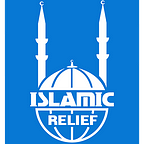My old school is now a scorching shelter for suffering families in Gaza
As an Islamic Relief aid worker* in Gaza returns to his high school, now a makeshift shelter, to take part in a distribution, he reports on dire living conditions faced by families struggling to survive.
We are nearing the 270th day of this inhumane, brutal war. Living conditions have deteriorated and even the simplest tasks require huge effort. Water supplies are so scarce that little things like washing your face in the morning or boiling an egg feel like fantasies. Getting cooking gas has become a dream.
We’re now in summertime and the temperatures are rising a lot. It’s hard for us to stay in the house in this scorching heat — for people living in tents, it must be unbearable. There’s no escape from the heat, especially at night. Last night, my son was sleeping in a pool of sweat. He’s started to get rashes, which are even more difficult to look after when we don’t have enough water to bathe.
Again, I’m telling you, my dear readers, that this is not life, it is death. We’re not even close to living any kind of human life. Being deprived of our basic human rights should be unimaginable in the 21st century, yet it is livestreamed all over the world and seems as if no decision-makers care to help us.
Trash and tainted water fill the streets
As the situation worsens for everyone, Islamic Relief is doing all we can to help. A couple of days ago, I went with my colleagues to see some of the makeshift shelters where we are supporting displaced people.
I could only watch as we passed scenes of misery and suffering all around. The beautiful places where I used to live had turned into a dystopian setting with darkness and rubble everywhere. The streets are filled with trash. Trucks are no longer collecting rubbish because there is no fuel. I could see piles of it everywhere, especially near shelters and tents. There were also ponds of sewage and gray water near the camps.
These makeshift shelters were created quickly, without infrastructure, so there is no system for people to get rid of the water they’re using. It all ends up in one place, creating perfect conditions for the spread of disease and illness. In several places, I could see people making fires with wood. With so little fuel, fire is used for everything now — making a cup of tea, heating up beans, cooking pasta and rice, or even preparing formula for a baby. The fires are not only polluting the air but also the food, which ends up containing ash, smoke, and dust. Imagine what it’s like for new mothers living in these conditions, for older people or people with disabilities.
My old school, transformed
We visited a school that is now a shelter. Coincidentally, it was my own secondary school, but it’s now completely different. Clothing hung at the windows of almost every classroom, drying in the sun. People made partitions of sheets of cloth in the corridors. Small tents had been set up in the playground and all over the basketball court where I used to play as a high school student.
A piece of fabric is all people have to separate their space from one another’s. It’s the only way they can seek some privacy. There, families don’t have their own toilets: women, men, boys, and girls all have to stand in line to use the toilet in the morning.
Women in Gaza dress modestly in public, but in the privacy of their home choose cooler attire. But women living in this shelter have no privacy, so must face the scorching heat while fully covered. Changing their clothes and washing themselves is hugely challenging for them.
Our team was delivering vegetables at the school-turned-shelter. A man told me that it had been a long time since he’d been able to get any vegetables and he was overwhelmed knowing he’d be bringing some back to his family. These people used to get good food for their families, but now it’s a struggle to even get some vegetables. Land in Gaza is arable and productive, almost anything can be grown and harvested here, but much of the farmland has been destroyed now.
My father has a friend who lives in the south, in Khan Younis. Every year, we used to visit him there to get fresh extra virgin olive oil and spend happy times under the trees. He called recently and told me all his trees have been destroyed. For me, that was one more memory destroyed, but, for him, it was his entire livelihood gone. For no other reason than being Palestinian.
No less human
I’m telling you about a 2-hour-long field visit with my colleagues but living in this hell is indescribable. It is a burden that makes it difficult to even breathe. It is a punishment without reason. It is a violation of all our rights and of our humanity. Humanity, to me, is becoming something questionable.
My children are being deprived of their education and I’m being deprived of the ability to find good food for them. Deprived of the chance to return to my home, to take a shower, or even to get medicine for my mom.
We are no less human than anyone else. We are Palestinians and we deserve to live with dignity. But because the world is indifferent to our suffering, we are living a nightmare.
Please help Islamic Relief support people in desperate need in Gaza: Donate now.
*This blog is anonymized to protect the safety and security of our colleague and others mentioned. Read the other blogs in this series here.
Editor’s note: This blog was submitted amid a fast-changing and deepening crisis. The information was correct as of Tuesday,July 02, 2024.
